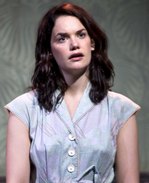SITE GUIDE
SEARCH
REVIEWS
REVIEW ARCHIVES
ADVERTISING AT CURTAINUP
FEATURES
NEWS
Etcetera and
Short Term Listings
LISTINGS
Broadway
Off-Broadway
NYC Restaurants
BOOKS and CDs
OTHER PLACES
Berkshires
London
California
New Jersey
DC
Connecticut
Philadelphia
Elsewhere
QUOTES
TKTS
PLAYWRIGHTS' ALBUMS
LETTERS TO EDITOR
FILM
LINKS
MISCELLANEOUS
Free Updates
Masthead
Writing for Us
A CurtainUp  London Review
London Review
 London Review
London ReviewThrough A Glass Darkly
|
Birds are somehow terrifying because they are above everything and can see what we are doing down here. — Karin
|

Ruth Wilson as Karin (Photo: Simon Annand) |
The theatre programme tells us that Ingmar Bergman's film Through A Glass Darkly was based on his marriage to Kabi Laretei and his life with her. She was Bergman's third wife, a concert pianist. He was married five times. In the play, Karin (Ruth Wilson) is married to a doctor Martin (Justin Salinger) and has come on holiday to the island to spend time with her novelist father David (Ian McElhinney) and her teenage brother Max (Dimitri Leonidas). Ruth expresses the wish that this should be a perfect holiday. At the beginning of the play Martin and David discuss Karin's illness and the probability of it recurring. Later we learn that Karin's illness is schizophrenia and that this is an inherited mental illness from her mother.
The production starts with a swimming scene on the beach, the mist of the cinematography of the original, steamy here as rising dry ice. This is such a wordy piece it made the one hour thirty five seem much, much longer. All the angst of the teenage brother discovering his sexuality and peeping through doors at his half clothed sister or reading girlie magazines inside a Latin text book fails to row my boat. Justin Salinger is normally a joy to watch but his character here is nondescript. The family disappointment at the father, only just having returned home from a few months abroad, escaping at the earliest opportunity just made me sigh with a lack of interest. It just seemed so relentlessly Scandinavian, under the surface and non expressed. As the father goes out the door he momentarily shakes with sobs, recovering his composure almost immediately.
David carelessly leaves his diary so that Karin finds it and reads the discussion her husband has had with her father about her illness. The discovery of Martin's syringes hidden in his shirt drawer confirms for Karin that Martin does not expect her to pass this holiday without a relapse. There are dream sequences when Karin gets up in the night and hears voices or sees birds as omens. Later she switches between shouting rancour and just as suddenly crumples into tears.
Justin Salinger's Martin seems helpless in the face of his wife's illness and frustrated at her lack of interest in sex. The father is selfish or already worn out by living through schizophrenia with his sick, now dead, wife and the brother may also have inherited the illness. It is all so depressing. I suppose the good news is that this is the only film Bergman had given permission to be dramatised!
Tom Scutt's set is pale wood and simple, revolving for the dream sequence. The cut away boat as David and Martin discuss Karin on their way to the mainland looked strange in the middle of all this realism. I see that an earlier note had listed Andrew Upton, Cate Blanchett's husband as the writer of the adaptation but that now it is credited to Jenny Worton. The director Michael Attenborough has given us a literal staging of the Bergman film.
The ending has extra bright epiphanic lighting as the ambulance helicopter arrives, fulfilling the bird prophesy and the doctor makes use of the hypodermic. It is all so horribly inevitable. And not even the brilliance of Ruth Wilson could lift the play for me so that there was anything resembling a dramatic crescendo.
|
Subscribe to our FREE email updates with a note from editor Elyse Sommer about additions to the website -- with main page hot links to the latest features posted at our numerous locations. To subscribe,
E-mail: esommer@curtainup.comesommer@curtainup.com
put SUBSCRIBE CURTAINUP EMAIL UPDATE in the subject line and your full name and email address in the body of the message -- if you can spare a minute, tell us how you came to CurtainUp and from what part of the country. |
| Through A Glass Darkly
Written by Ingmar Bergman Adapted by Jenny Worton Directed by Michael Attenborough Starring: Ruth Wilson, Justin Salinger With: Ian McElhinney, Dimitri Leonidas Design: Tom Scutt Lighting: Colin Grenfell Sound and Music: Dan Jones Running time: One hour 35 minutes without an interval Box Office: 020 7359 4404 Booking until 31st July 2010 Reviewed by Lizzie Loveridge based on 17th June 2010 performance at the Almeida, Almeida Street, London N1 1TA (Tube: The Angel) |
|
REVIEW FEEDBACK Highlight one of the responses below and click "copy" or"CTRL+C"
Paste the highlighted text into the subject line (CTRL+ V): Feel free to add detailed comments in the body of the email . . . also the names and emails of any friends to whom you'd like us to forward a copy of this review. |
|
London Theatre Tickets Lion King Tickets Billy Elliot Tickets Mighty Boosh Tickets Mamma Mia Tickets We Will Rock You Tickets Theatre Tickets |




